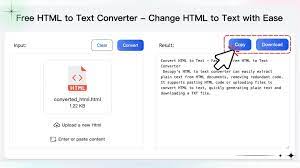In the digital world, web developers, writers, and data analysts often need to convert HTML files into plain text (TXT). The reason is simple—clean text is easier to read, analyze, and store. HTML to TXT conversion helps remove tags, formatting, and code, leaving behind only the readable content. Whether you’re extracting website data, preparing SEO text, or cleaning up code for analysis, understanding this process saves time and boosts productivity.
What Is HTML to TXT Conversion?
HTML (HyperText Markup Language) structures web pages with tags like <p>, <div>, and <a>. TXT, or plain text, removes those tags and focuses on the actual words. Converting HTML to TXT means stripping away design elements, scripts, and metadata to keep only the human-readable text. This makes content cleaner, easier to process, and more useful for analytics or archiving.
Why Convert HTML to TXT?
Easier to Read and Edit
Plain text is universal and simple to edit. Anyone can open it using Notepad, TextEdit, or any basic text editor without needing a browser.
Ideal for Data Analysis
When scraping websites or collecting data, HTML tags can interfere with text processing. TXT ensures clean data for analysis and automation.
Helps SEO Experts
SEO professionals use plain text to check keyword density, readability, and on-page optimization without distractions from code.
Accessibility and Backup
TXT files are lightweight, device-friendly, and perfect for long-term storage or accessibility audits.
Faster File Handling
Since TXT doesn’t carry extra code, it’s faster to load, copy, and transfer compared to bulky HTML files.
Methods to Convert HTML to TXT
There are many ways to convert HTML into plain text depending on your skills, goals, and tools available.
Method 1: Online HTML to TXT Converters
This is the easiest method. Simply copy your HTML, paste it into an online converter, and get plain text instantly.
Steps:
- Open a reliable converter like Code Beautify or Convert Town.
- Paste your HTML or upload the file.
- Click convert and copy or download the text output.
These online tools are ideal for quick, small conversions and don’t require installation.
Method 2: Manual Conversion with Text Editors
If you have basic text-editing needs, open the HTML file in Notepad or VS Code and manually remove tags. You can also use Find and Replace (Ctrl + H) to delete < and > tag pairs. Save the cleaned text as .txt. While this method is slower, it works for short documents or sections.
Method 3: Using Python (Automated Conversion)
For developers or data scientists, Python is a powerful option. You can use libraries like BeautifulSoup to automate the conversion:
from bs4 import BeautifulSoup
html_content = open('example.html', 'r').read()
soup = BeautifulSoup(html_content, 'html.parser')
text = soup.get_text()
with open('output.txt', 'w', encoding='utf-8') as file:
file.write(text)
This code removes all HTML tags and saves a clean text version automatically.
Method 4: Command Line Conversion
If you’re comfortable using Linux or macOS, you can use a terminal command:
lynx -dump example.html > output.txt
This creates a plain-text version of any webpage using the built-in text browser “lynx.”
Benefits of HTML to TXT Conversion
Clean, Readable Output
Removing tags gives you pure text without design clutter, ideal for documentation or editing.
Compatibility Across Systems
TXT files open on any device, operating system, or software.
Better for AI and Data Science
Clean text is essential for machine learning models, natural language processing, and sentiment analysis.
Great for Writers and Bloggers
Writers can use TXT outputs to review structure, grammar, and flow without distractions.
Lightweight and Easy to Store
TXT files are small, fast to transfer, and perfect for archiving large datasets.
Common Challenges in Conversion
Loss of Formatting
HTML supports bold, italics, and lists that TXT cannot display. Use line breaks or bullet markers to retain readability.
Encoding Problems
Always ensure your converter or script uses UTF-8 encoding to support global characters and emojis.
Mixed or Dynamic Content
Web pages with scripts or dynamic JavaScript content may not fully convert. Use scraping tools for better accuracy.
Large Files
Online converters might limit file size. For bulk conversion, use offline tools or Python scripts.
How to Preserve Readability in TXT Files
Even though TXT has no styling, you can structure text to remain clear and organized:
- Use line breaks for paragraphs
- Add dashes or bullets for lists
- Keep headings in uppercase or marked with “##”
- Maintain blank spaces for section clarity
These small tweaks improve legibility in plain text form.
HTML to TXT for SEO and Marketing
SEO experts use HTML to TXT conversion to analyze visible content on a webpage. It helps them identify keyword usage, remove unnecessary HTML noise, and focus on text that search engines actually read. It also helps with accessibility reviews to ensure all content is visible to crawlers and screen readers.
HTML to TXT for Data Science and Web Scraping
In web scraping, extracted HTML often contains scripts and style elements that distort data. Converting to TXT ensures only useful text remains. Data scientists then feed this text into analytics tools for sentiment analysis, keyword tracking, or AI model training. This step is crucial for clean, usable datasets.
Tools Comparison
| Tool | Type | Best For | Free/Paid |
|---|---|---|---|
| BeautifulSoup | Python Library | Automation | Free |
| Convert Town | Online | Quick use | Free |
| Code Beautify | Online | Bulk conversion | Free |
| Pandoc | Command-Line | Batch processing | Free |
| Text Mechanic | Online | Small conversions | Free |
| Each tool serves different users—online tools for quick fixes, and libraries like BeautifulSoup for automation and large-scale tasks. |
Best Practices for Clean Conversion
- Always back up your HTML files before conversion.
- Use UTF-8 encoding to handle special symbols.
- Clean unwanted spaces or special characters afterward.
- Choose tools that support multiple languages and entities.
- Test your output for accuracy before using it in data projects.
Future of HTML to TXT Conversion
As technology advances, AI-powered converters will dominate this field. They’ll automatically recognize key content, skip ads or sidebars, and produce clean, context-aware text. These intelligent systems will help professionals save even more time and increase accuracy in conversion tasks.
Conclusion
Converting HTML to TXT is simple yet powerful. Whether you’re a developer extracting website data, an SEO analyst reviewing content, or a writer editing text, this process ensures clarity, accessibility, and ease of use. The right tools—from online converters to Python scripts—can make your work faster, more efficient, and more precise. Understanding this skill gives you full control over web content and turns cluttered code into valuable, readable information.







